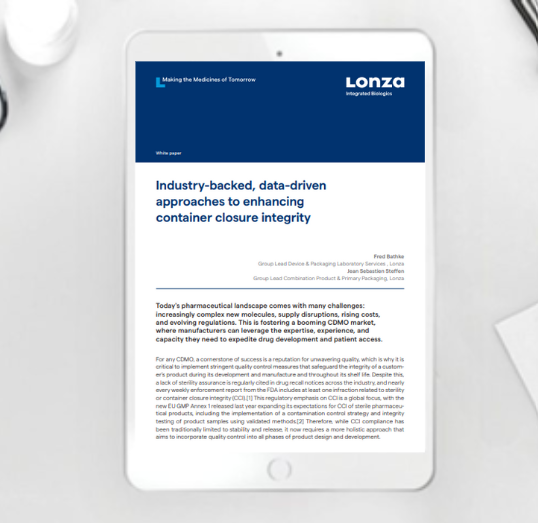The Critical Role of CCI in Drug Development and Manufacturing
Posted: 24 September 2025 | Lonza | No comments yet
This whitepaper provides a detailed examination of Lonza’s holistic, data-driven approach to CCI, developed in collaboration with industry experts and applied across our global network for parenteral combination products.
For Contract Development and Manufacturing Organizations (CDMOs), a reputation for uncompromising quality is central to success. However, sterility assurance continues to represent a leading cause of drug recalls, with FDA enforcement reports regularly citing container closure integrity (CCI) deficiencies. In parallel, the revised EU GMP Annex 1 has reinforced global expectations, emphasizing contamination control strategies and validated CCI testing methods across sterile product development.
The implication is clear: CCI compliance must evolve from a release- and stability-focused exercise to a comprehensive, lifecycle-spanning strategy.
Current industry challenges:
The pharmaceutical sector is navigating an increasingly complex landscape characterized by:
- Development of novel and complex therapeutic modalities (e.g., mRNA, lipid nanoparticles)
- Supply chain vulnerabilities impacting material consistency and availability
- Escalating costs that demand efficient, resource-conscious development pathways
- Expanding regulatory requirements mandating science- and risk-based quality strategies
These dynamics necessitate robust, proactive quality control measures capable of ensuring sterility, product integrity, and compliance from early development through commercial distribution.
This whitepaper provides a detailed examination of Lonza’s holistic, data-driven approach to CCI, developed in collaboration with industry experts and applied across our global network for parenteral combination products.
Key topics include:
- Integration of risk-based CCI strategies into container closure system development, material qualification, manufacturing, and distribution/storage.
- Comparative analysis of probabilistic vs. deterministic CCI testing methods, with emphasis on helium leak detection as the most sensitive and regulatory-preferred deterministic technique.
- Application of proprietary testing technologies, enabling CCI assessment under challenging conditions, including cryogenic storage at -80°C for sensitive modalities.
- Use of early, platform-based data generation to minimize reliance on scarce drug substance, shorten development timelines, and mitigate regulatory/technical risks.










